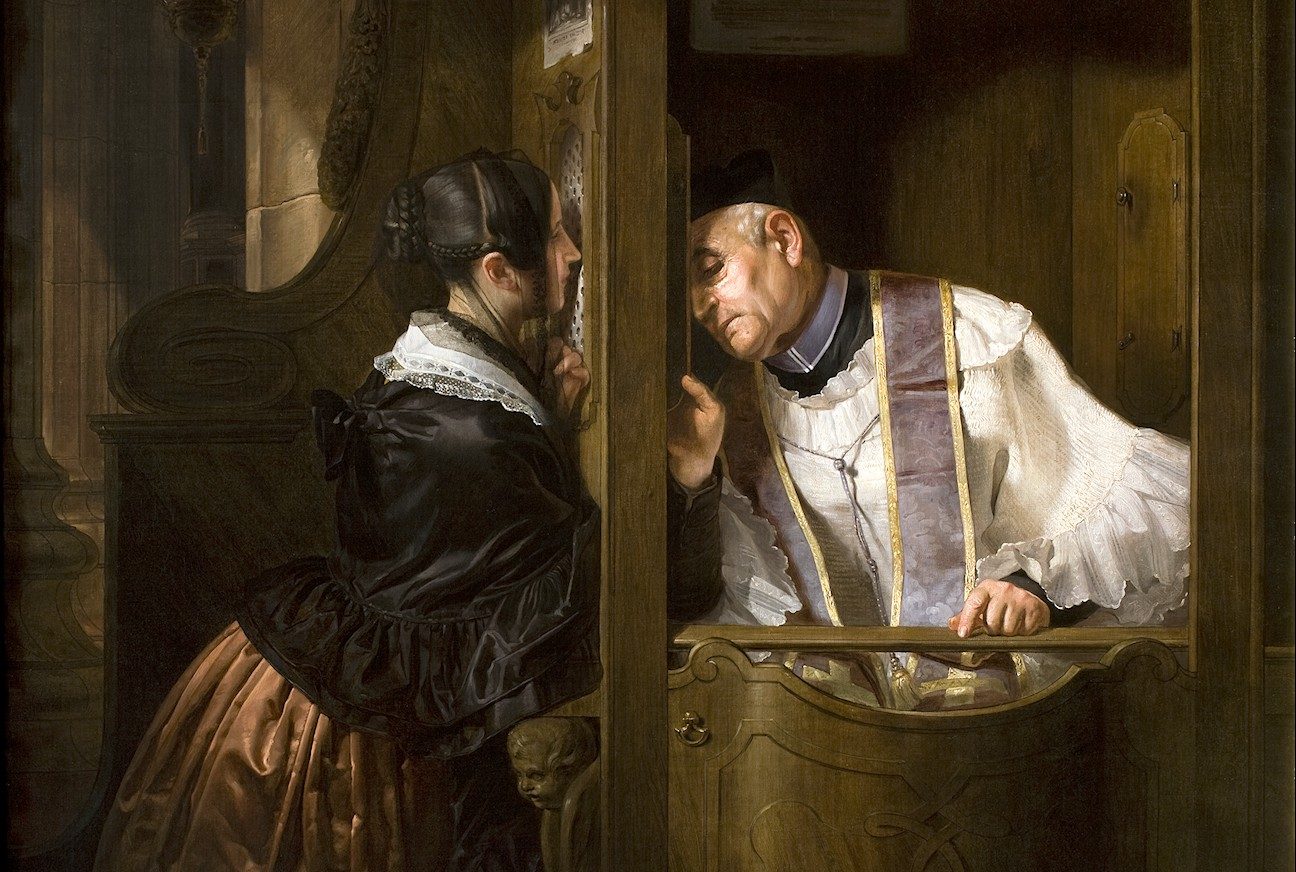Image: The Confession, by Giuseppe Molteni, 1838, sourced from Wikimedia Commons, credit to Fondazione Cariplo, licensed under CC BY-SA 3.0
By Amber Kinloch
Catholics are an immensely blessed lot. United in our faith, we can go to Confession with any Catholic priest we want, assuming he has the proper faculties. Christ is present in the sacrament, regardless of who the priest is.
Nevertheless, it’s helpful (if possible) to have a regular confessor, someone who knows you through and through. But we shouldn’t pick a priest out of convenience or just because we like him. Rather, we should exercise some discrimination. We’re fighting a spiritual battle, after all. A discerning confessor will urge us forward and help us up when we fall. On the other hand, a careless or imprudent priest can cause a great deal of harm to our souls.
Based on my own experiences, here are some marks I advise you to look for in a confessor.
#1 – A Patient, Listening Ear
Going to Confession with some priests feels like going to the carwash. You’re in and out in two minutes flat, if that, every single time.
Now to be clear, there’s nothing wrong with brevity. If you’re going to Confession regularly, “short and sweet” will typically be the standard. Besides, there is the human consideration of time limits and other people waiting in line. But when brevity is rooted in impatience on the priest’s part, that is not helpful. A person can be distracted from the unique, unrepeatable meeting with Christ that takes place in every Confession when the priest seems to be hurrying them along. An air of impatience on the priest’s part can also hold someone back from raising a delicate issue or seeking needed advice.
On the other hand, there are priests who take time to talk without sparing any time to listen. They offer advice, it seems, just because they feel an obligation to do so, without making an effort to pause, ask questions, and truly understand what someone is saying. If you notice this happening and find it’s discouraging you, stirring up scruples, or impacting your ability to get advice, try to find a different confessor if possible.
By contrast, priests who listen also tend to be wise confessors. They hear you out (though without letting you ramble) and stay focused on the matter at hand, asking questions as they feel necessary. They take account of pertinent details (e.g., your age or marital status). The advice and encouragement they offer is clear and on point.
#2 – The Bold Voice of Truth
A good confessor has no worries about whether you’ll approve of him or not. He tells you the truth with charity, not holding anything back.
Sometimes, it’s hard to hear such advice. Even when a confessor is tactful, it can feel embarrassing. But it’s better to know something’s wrong so that you can deal with it than to live a doomed dream.
#3 – A Push to Improve
It’s hard to keep up the spiritual battle. Sometimes, discouragement plagues us. Other times, we struggle with indifference and the urge to think, “Well, this particular sin really isn’t that bad.” This is why I appreciate it when a priest asks me how things are going, or points out how I keep confessing the same sin. It gives me a jolt, spiritually, and reminds me of the stakes at hand, setting me back on track.
#4 – Concrete Penances
Occasionally, I’ve gotten a penance along the lines of “Go and amend your life” or “Do something nice for your mother this week.” The priest might mean well, but I do not find this approach helpful. It leaves someone in doubt as to whether they’ve performed their penance or not, causing unnecessary unrest in the soul.* By contrast, “Pray three ‘Our Fathers’, asking for the grace to be more patient this week” is concrete and practical.
*Note: While we should always strive our best to do our penance, it is not an integral part of the sacrament of Penance. It’s given to help us pay off the debt of temporal punishment incurred due to our sins. It’s also an act of charity directed towards the Church where we make reparation for the damage we’ve done by our sins. If we do not do it, however, that does not change the fact that our sins have been forgiven, assuming we confessed all our mortal sins and were truly sorry for them, and that the priest correctly administered the absolution.
A Last Note
The points I’ve outlined here are but a guide. Good confessors can be possessed of a wide range of gifts and personalities that are meant to help different sorts of persons. It’s up to each person to prayerfully discern what helps them.
Some people like a priest who takes initiative in asking questions and offering advice. Others get on fine with a quieter priest with whom they have to take initiative. Gentle-hearted souls might be sensitive around a confessor with an abrupt manner or who triggers their scrupulosity with too much advice. Others need a strong hand to take them to task.
Seek to know yourself. Also, trust your gut instinct. If you encounter Christ through a certain priest, consider going to him consistently, regardless of whether the priest himself is likeable or not.
Above all, remember that God can speak through any priest. Each one is an “Alter Christus” and, hopefully, a channel of grace for many souls. Pray for them and thank God for these men. We need them.

Amber Kinloch
Amber writes from the bunker of her living room. There she hunkers down with her laptop and a blanket while keeping an eye and ear tuned in to the activity of family life. Music set on loop keeps her energy flowing as she muses on the deeper happenings of ordinary life and what food to restock the fridge with.






0 Comments